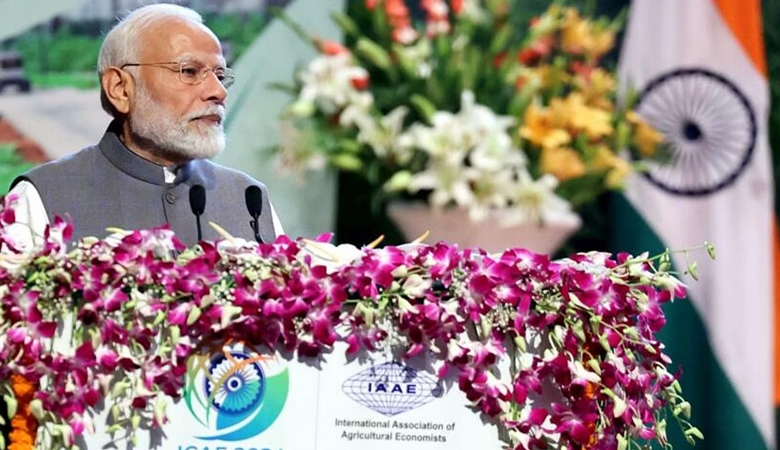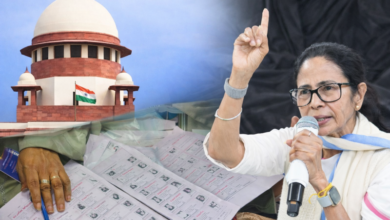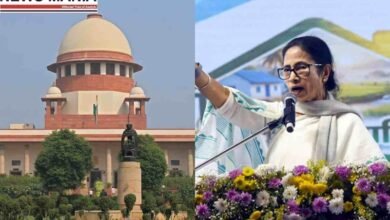India Has Become A Food surplus Country: PM Modi Highlights Agriculture Boom and Global Security Solutions

News Mania Desk/Agnibeena Ghosh/3rd August 2024
Prime Minister Narendra Modi announced on Saturday that India has become a food surplus nation and is actively working to provide solutions for global food and nutritional security. Speaking at the 32nd International Conference of Agricultural Economists (ICAE), held in India for the first time in 65 years, Modi emphasized the centrality of agriculture in India’s economic policies and highlighted significant strides in sustainable and climate-resilient farming.
Recalling India’s past, Modi noted that during the last ICAE conference held in India, the country was a newly independent nation facing considerable challenges in agriculture and food security. Fast forward to today, and India stands as the world’s top producer of milk, pulses, and spices, and the second-largest producer of food grains, fruits, vegetables, cotton, sugar, and tea. “India is now a food surplus country,” he declared, highlighting this transformation as a testament to the nation’s agricultural progress.
Modi’s address underlined the significance of India’s role in global food security. He pointed out that where once India’s food security was a global concern, the country is now contributing to global food and nutritional security. With approximately 1,000 delegates from around 70 countries attending the conference, Modi emphasized India’s valuable experience in food system transformation, particularly for the global south.
Reiterating India’s commitment to global welfare, Modi highlighted various initiatives such as ‘One Earth, One Family, One Future,’ ‘Mission LiFE,’ and ‘One Earth One Health.’ He stressed the importance of a holistic approach to sustainable agriculture and food systems, stating that these challenges can only be addressed by viewing the health of humans, plants, and animals as interconnected.
Agriculture has always been a focal point in India’s economic agenda, and the Union Budget 2024-25 has given a significant push towards developing an ecosystem that supports Indian farmers. Modi pointed out that 90% of Indian farmers are smallholders, and these small farmers are crucial to the country’s food security. This model, prevalent in several developing Asian countries, makes India’s approach applicable and beneficial beyond its borders.
In the last decade, India has introduced 1,900 new climate-resilient crop varieties and promoted chemical-free natural farming. The country is also advancing towards a 20% ethanol blending target in petrol, reflecting its commitment to sustainable agricultural practices. Modi highlighted the government’s efforts to tackle nutrition challenges, water scarcity, and climate change. He presented millet, or ‘Shri Anna,’ as a solution due to its high yield with minimal water requirement, and expressed India’s readiness to share its millet production globally.
Digital technology has also been leveraged in India’s agricultural sector. Modi discussed the PM Kisan Samman Nidhi scheme, which transfers funds directly to farmers’ bank accounts, and a digital public infrastructure for crop surveys, providing real-time information to aid farmers in making data-driven decisions. Additionally, the government has initiated a massive campaign to digitize land records, assigning digital identification numbers to farmers’ lands and promoting the use of drones in farming, with ‘drone didis’ trained to operate them.
These initiatives are not only aimed at improving the economic conditions of Indian farmers but also at strengthening global food security. The ICAE conference, attended by Union Minister for Agriculture and Farmers’ Welfare Shivraj Singh Chouhan, NITI Aayog Member Ramesh Chand, Conference President Matin Qaim, and ICA Secretary Himanshu Pathak, provides a platform for young researchers and leading professionals to present their work and network with global peers. The triennial event, organized by the International Association of Agricultural Economists, runs from August 2-7, aiming to influence policymaking and showcase India’s advancements in agricultural research, digital agriculture, and sustainable agri-food systems.






